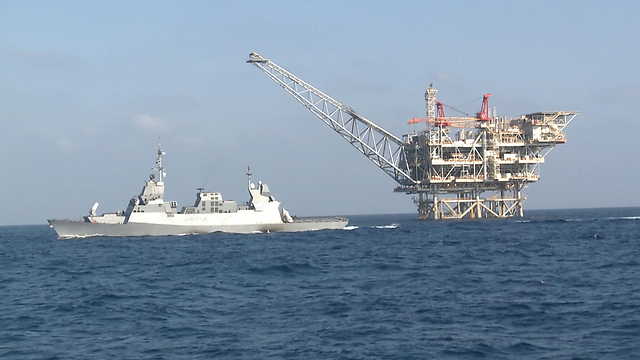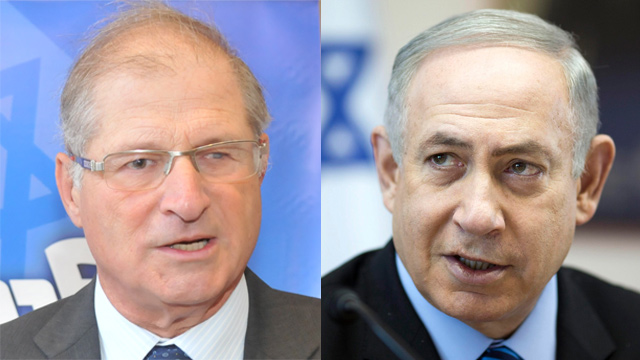
Swimming in the prime minister’s aquarium
Op-ed: A brave, independent attorney general would order attorneys David Shimron and Yitzhak Molcho to either leave the prime minister’s operations room or quit their private businesses altogether. The question is whether Avichai Mandelblit, who came from the prime minister’s bureau, is capable of thoroughly cleaning up the system.
They were asked to approve an allotment of NIS 2 billion (about $520 million) from the defense budget for routine matters, and to approve a separate allotment of NIS 1,000,280,000 ($256 million) for the purchase of two military vessels to defend Israel’s gas wells. They were not told if that was the actual price or a down payment.

The letter with the request was submitted to the committee that same morning, Margalit, who questioned the urgency, did not receive any answers. The request was approved.
Looking back, Margalit refers to that event as “the Yom Kippur of the vessels.”
The need for the two ships is indisputable. The gas rigs installed in Israel’s economic water are exposed to missiles from Lebanon, Syria and Iran, as well as to attacks of vessels from the sea. When the state began the litigation with businessman Yitzhak Tshuva and his partners on the distribution of the gas profits, I asked why were they not required to cover at least part of the security expenses. Security is the state’s business, not the those who own the franchise, the state responded.
In the October meeting, Margalit asked why the money was being taken from the budget. Wouldn’t it be more appropriate to borrow the money and repay the loan from the gas profits in the future? He did not receive a response on that, either.
The police investigation ordered last week by Attorney General Avichai Mandelblit , focuses on the vessels, not on the submarines. The investigators, members of the Lahav 443’s financial unit, will be interested in knowing why the international bid for the construction of the two ships was suddenly canceled, and why the deal was signed instead with the German company without a tender. As far as I know, four shipyards operating in different countries, including one which is partly owned by Israeli businessman, showed an interest in the tender. Someone decided to cut a corner.
Is Israel seen as a Third World country?
The job was given to Howaldtswerke-Deutsche Werft (HDW), a subsidiary of the ThyssenKrupp conglomerate corporation, which manufactures the submarines ordered by Israel. The investigators will have to peel a few layers before they reach the gist. ThyssenKrupp is a huge corporation, which produces vessels, spare parts for cars, etc. Its work ethic in Third World countries has generated harsh accusations in the German media, police investigations and forced resignations among the corporation’s leadership. The investigators, in Germany and in Israel, will try to understand whether the corporation’s executives saw Israel as a Third World country, too.
HDW was founded in 1838 in the city of Kiel, on the shores of the Baltic Sea. Its official history mentioned the fact that it built “Christina,” the famous yacht belonging to Greek oil tycoon Aristotle Onassis, and skips its enormous contribution to the Nazi war effort. The 64 submarines (U-boats) it built during World War II destroyed thousands of the Allies’ military and civil vessels.
After the war, all the German shipyards were dismantled, apart from this one. In 2005, it was acquired by ThyssenKrupp. In 2008, in the middle of the global economic crisis, ThyssenKrupp was on the verge of bankruptcy. It was looking for a buyer.
ADM, an Abu Dhabi-based holding company, showed an interest. The company’s chairman is Ahmed Darwish Al Marar of Abu Dhabi; the CEO is Iskandar Safa of Lebanon, a Christian Maronite, one of the most prominent figures in the global shipping industry. In October 2006, ThyssenKrupp signed a memorandum of understandings with the company from Abu Dhabi, which would have given the Arab firm half of the ownership over the production of the vessels, apart from the submarines.
For reasons that have never been explained, the agreement was not implemented. The Arab company eventually bought the production of civil vessels in Germany and the corporation’s military shipyard in Greece. Its ties with the German corporation remain tight—so tight, in fact, that a defense establishment source wondered this week whether these ties were taken into account when the contracts were signed.
Additional layers
The next layer the investigators will have to peel is the maintenance issue. A was said last week about the purchase of the submarines and the ships. Little was said about the maintenance. The prime minister can buy more and more submarines, but the Navy will not be able to maintain them. The maximum number is six. So when the construction of the three submarines ordered by Israel will be complete, it will have to take the three old submarined out of service.
In internal IDF discussions, the Navy avoided promising that it would be able to maintain the two vessels purchased to protect the oil wells. Something will have to be done, and fast—either a major expansion of the Navy shipyard in Haifa or a privatization of the military shipyard and joining forces with Israel Shipyards and other elements, including the German corporation.
With all this lurking in the background, representatives of the German company Miki Ganor and attorney David Shimron met with the Histadrut labor federation’s chairman, Avi Nissenkorn. They pressured him to agree to a privatization. As this was going on, head of the shipyard workers' union Nissim Elimelech wrote a letter to the IDF comptroller, demanding the dismissal of Navy officers who were pushing for the privatization of the entire shipyard or part of it. The letter was exposed by Yedioth Ahronoth’s military correspondent, Yossi Yehoshua.
Miki Ganor is the next layer to be examined. Ganor, a Navy graduate, is a businessman who once got into trouble in Austria. Today, he is part of Caesarea’s upper crust, along with Shlomi Fogel, the owner of Israel Shipyards and an associate of Netanyahu's, along with Yitzhak Molcho—the prime minister’s lawyer, relative and associate— as well as the prime minister himself.

The investigators may ask why the German company has a representative in Israel when, according to the Prime Minister’s Office, Israel is working directly and only with the German government on this issue. Why did Ganor replace the previous representative, former Air Force officer Shaike Bareket, whose colleagues in the defense establishment saw as an upright and decent person? And why did Ganor choose to appoint David Shimron, the prime minister’s personal lawyer, as his attorney? Did he do it at the Germans’ orders, or behind their backs, as they claim he did?
This is when the investigators will be able to return to the first layer of this parrticular onion—namely, to Avriel Bar-Yosef, who served as deputy head of the National Security Council (NSC) and who was supposed to be appointed head of the NSC by Netanyahu. Bar-Yosef has been questioned as a suspect in a different bribery affair, which also involves the Germans. He is considered the father of the submarine deal. If and when it is required, he will be an ideal candidate for state witness.
Attorney General Mandelblit held a discussion in his office last week in the presence of State Attorney Shai Nitzan, Deputy Attorney General Dina Zilber and others. The subject was the recent revelations made by Channel 10 reporter Raviv Drucker. The participants realized that they had been wrong to authorize Justice Ministry Spokesperson Moshe Cohen to tell the press that there were no criminal aspects to the affair. The public expects a certain move—if not action, then a clarification. They found it difficult to decide what to do, until a phone call arrived from the police and ended their suffering. There is new information, they were told, criminal, something that came up in Bar-Yosef’s investigation or reached the police in a different way.
Major-General Meni Yitzhaki, head of the police’s investigation unit, arrived at the Justice Ministry in the afternoon. The details he provided left no room for doubt. Mandelblit ordered a police investigation and made it public.
Mandelblit is a graduate of the Harpaz affair. He barely pulled himself out of it, admonished and humiliated. He was afraid that the same process, in which a conflict between the political echelon and the IDF develops into a criminal investigation and poisons the entire system, would repeat itself. He looked for a way to calm things down: The State Attorney’s Office would monitor the reports, Dina Zilber would look into the conflict of interests prevention agreement signed with Shimron and Molcho’s law firm, the politicians and the media would do what they do, and the affair would be over. He was wrong, big time: Now he has no choice but to prove that he is determined to investigate, fearlessly and without prejudice.
Structured corruption
One of the main people to be interrogated will be attorney Shimron, who Mandelblit had worked closely with when he served as cabinet secretary. Shimron is in trouble. He has completely denied the allegations that he used his influence in the public arena in favor of the German corporation, and there are at least two significant cases in which his denials were contradicted by the facts. He also denied that he had ever informed his client, Prime Minister Netanyahu, of his commitment to the German corporation. An email sent by the defense establishment’s legal adviser, Ahaz Ben-Ari, allegedly contradicts that denial.
Senior Justice Ministry officials are in trouble, as well, albeit on a less dramatic level. After Molcho, Shimron’s partner and relative, was appointed as Netanyahu’s diplomatic messenger, the two signed a conflict of interest agreement. The agreement, which was signed during former Attorney General Yehuda Weinstein’s term, has more holes than Swiss cheese.
Later, when it turned out that the two were specializing in businesses in the media area, including regulation, while the chief regulator, Communications Minister Benjamin Netanyahu, is their private client, Justice Ministry officials were forced to review the agreement once more. The holes remained, and so did the lack of transparency. One could not escape the conclusion that senior officials in the State Attorney’s Office are intimidated by the power gained by Shimron and Molcho, and by their association with royalty.
The way these two have been treated should be compared to the way others have been treated. Energy Minister Yuval Steinitz, for example, wanted to appoint Shaul Meridor as his ministry’s director-general. It turned out that Meridor’s brother, Matan, is a junior partner—with a 3-percent ownership—in a law firm that deals, among other things, with gas. The brother was forced to leave that law firm and open one of his own. Now compare these two brothers to Netanyahu’s relatives and associates.
A brave, independent attorney general should put an end to this practice. This is, after all, institutionalized corruption. There should no longer be a mix between private and government businesses, definitely not inside the prime minister’s aquarium. In Shimron and Molcho’s case, either they leave the prime minister’s operations room or give up their private businesses altogether.
The question is whether Mandelblit, a graduate of the prime minister’s bureau, is capable of thoroughly cleaning up the system. I recently read, in a book describing the corruption in the American political establishment, an old Yiddish proverb. After asking, 'Who invented water?' It answers, 'We don’t know, but it was definitely not invented by the fish that swam in it.' Mandelblit, it can then be said, swam in the swamp that he now has to dry up.
The investigation does not have to go into the number of submarines the army needs, what the army said, what the NSC said, what former Defense Minister Moshe Ya’alon said and how Netanyahu went behind his back. These are issues for a public discourse, for the state comptroller, not for a criminal investigation.
I asked high-ranking security officials in both the past and present was their reaction was to the submarine deal. Some thought it was a mistake, though a legitimate one. Some saw it as a decent decision. And some even thought it was the right decision to make. The argument mainly revolved around strategic questions in regard to Iran, the IDF's priorities and the security budget. No one suspected Netanyahu made billions of dollars-worth of decisions to put bribe money in his own bank account. There isn't a shred of evidence that points in that direction.
Those who opposed the deal mainly wondered about its timing: the submarines won't be needed for another 15 to 20 years, and in the meantime the equipment will only get better and cheaper, our security needs will change and so will our priorities. Those who supported it said that if Netanyahu prefers to strike a deal with Angela Merkel and not her predecessors, he has a right to do so. They compared the deal to the deliberations that had prevented the government from purchasing F-35 fighter jets: both require a commitment that spans generations. It is likely that by the time the last F-35 arrivesm 80% of its missions could be achieved for much less cost by UAVs (unmanned aerial vehicles). It is less likely, however, that a similar revolution will happen under water.










